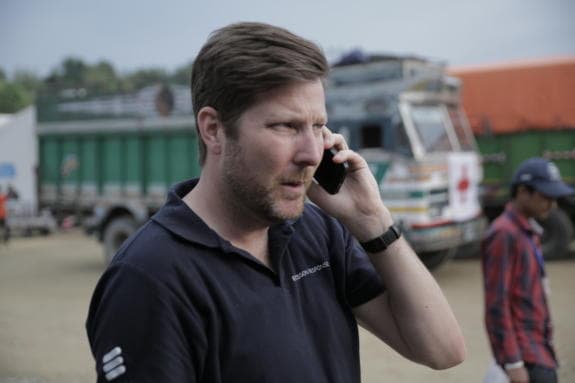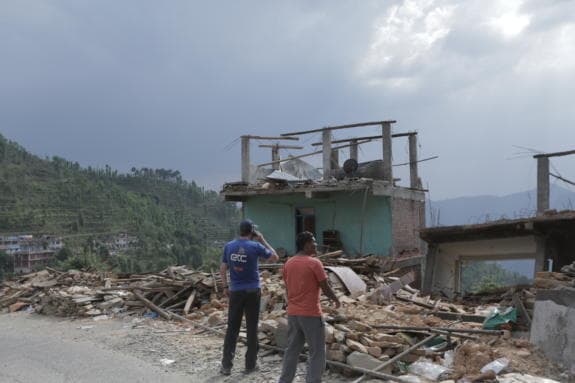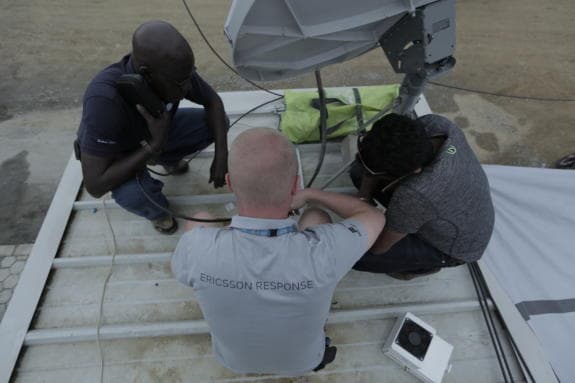
Tech experts
in emergencies
In 2000 a group of employees at Ericsson wanted to support humanitarian efforts and started the Ericsson Response initiative. Fifteen years later the initiative has grown, and today 157 employees from 33 countries are working as volunteers in emergencies, together with UNICEF and other partners.
Publicerad |
2016 06 13
Uppdaterad |
2016 06 13
Tech experts in emergencies
Brent Carbno, Program Director Ericsson Response.
Brent Carbno is Program Director Ericsson Response.
Brent, what is the Ericsson Response initiative, and why was it started?
– Ericsson Response was started in 2000 by Ericsson employees that wanted to support humanitarian efforts with their skills and Ericsson’s technology. It was started as an employee initiative and is still driven by employees to this day. When it was launched 15 years ago, ICT’s role in disaster relief was in its infancy.
– Today it is widely accepted that connectivity is as vital as food, shelter and water when disaster strikes. Since the launch of Ericsson Response in 2000 and our first major mission to Afghanistan, hundreds of employees have supported over 40 humanitarian relief efforts in 30 countries.
How does it work in practice, in the field?
– Ericsson Response will only deploy upon a request from a humanitarian partner. We have partnerships with UNICEF and several UN agencies and international NGO:s. Once on the ground, we work under the guidance and management of the partner organization that requested our support. We could deploy communications equipment and/or volunteers, depending on the needs.
– Our volunteers generally are available for one month per year, so for longer term requests we will rotate new staff every month to cover the needs of the emergency deployment. We have supported missions anywhere from one month to four years and counting.
Demolished buildings after the Nepal earthquake in 2015.
What value does the initiative add to Ericsson?
– Internally the program has an impact on employee engagement and motivation, both for those directly involved and for the others that are proud of Ericsson for being involved in humanitarian work. Of course being able to use your skills and expertise to support humanitarian efforts is very important and meaningful.
What advantages, and potential challenges, do you see in working with the UN?
– Working with the UN ensures we can have a greater impact on a large number of affected people during a disaster. Since we have clear objectives and purpose when we deploy, we are confident our contributions are meaningful and fill a necessary role during response efforts.
– A current challenge would be around how to support response efforts even when the large-scale UN response mechanisms (i.e. cluster activation) are not engaged during an emergency. Sometimes more localized emergency responses still need outside support.
Apart from Ericsson Response, does Ericsson engage in other ways?
– We do, just recently during the World Humanitarian Summit in Istanbul we announced our commitment to develop an Ericsson Emergency Wallet, a mobile financial services solution, for deployment in the immediate aftermath of disaster or crises to support humanitarian organizations and affected populations.
– And in 2015, we became signatories to the Humanitarian Connectivity Charter launched by mobile operator industry organization the GSMA. The Charter sets out to enhance coordination within and among mobile network operators before, during and after a disaster, and to scale and standardize the industry’s preparedness and response activities.
Ericsson Response staff during the mission after the Nepal earthquake in 2015.
And finally, do you have any advice to give to other companies who wish to provide volunteers or expertise, e.g. in humanitarian situations?
– My advice would be to ensure that everyone involved has a clear mandate and they understand exactly what they will do when they are on the ground in an emergency. This means engaging with humanitarian partners prior to an emergency to understand how everyone will work together and what responsibility each actor will undertake. An emergency can often be a chaotic situation with very limited resources, so the focus needs to be on saving the lives of the affected populations in the most efficient and effective way. Elaine, can you share your views on the summit?
– Extensive commitments were made to strengthen accountability, respect international standards, protect women and children, reduce suffering, and find solutions to the multi-faceted and interlinked challenges and issues. There is also a clear move to put people at the center, and to invest in education, resilience building, and the formation of new alliances and initiatives, including the Connecting Business Initiative which we committed to already in World Economic Forum in Davos early this year. The initiative is looking at linking private sector skills and resources before, during and after emergencies, and both mobile and satellite industries are seen as having a key role in humanitarian response, something we from Ericsson have been working with for 15 years, and much is ongoing to improve connectivity also for affected populations.
– As Brent mentioned we also announced a new commitment in the area of mobile financial services, called Ericsson Emergency Wallet, and it was great to see the role of Mobile Financial Services reflected in the outcome document of the summit.
– Many new and innovative partnerships were announced between humanitarians and private sector financial and technology companies, who will make sure their expertise in digital payments, mobile money and other areas to help meet people’s needs more quickly and efficiently, this is of course one of the great outcomes. I would say that WHS was the first UN event with true attempt at integrating the private sector. The importance of finding real, viable and scalable solutions cannot be under emphasized, and the private sector simply must be brought in even more.
Are you intrested in supporting UNICEFs work for children around the world? Read more.
Vill du och ditt företag också vara med och stötta UNICEFs arbete för barn runt om i världen? Läs mer här.


